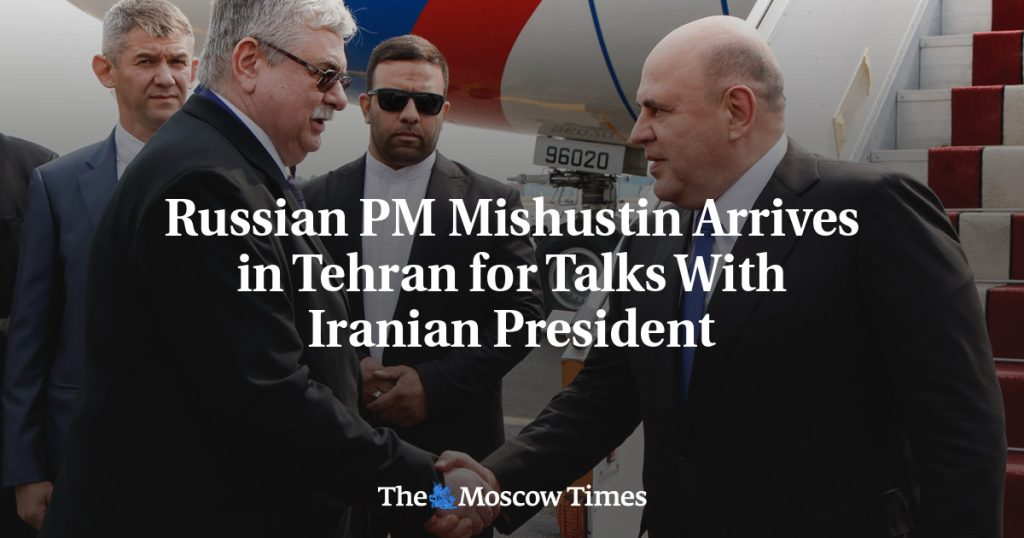Russian Prime Minister Mikhail Mishustin visited Tehran for a meeting with Iranian President Massed Pezeshkian, in preparation for a planned meeting between Pezeshkian and Russian President Vladimir Putin during the BRICS summit in Kazan. Mishustin’s visit also comes amid accusations from Western countries that Iran is supplying ballistic missiles to Russia for use in the Ukraine war, as well as reports of Iran mediating talks between Russia and Yemen’s Houthi militias regarding anti-ship cruise missile supplies. Upon his arrival in Tehran, Mishustin was welcomed by Iranian officials and Russian diplomats, with a focus on enhancing Russian-Iranian trade and economic cooperation in various sectors.
The visit of Russian Prime Minister Mikhail Mishustin to Tehran aimed to strengthen Russian-Iranian trade and economic cooperation, with a focus on sectors such as transport, energy, industry, and agriculture. The visit comes at a crucial time as Western governments accuse Iran of supplying drones and missiles to Russia, which Tehran denies, while the Kremlin remains noncommittal. The EU has imposed sanctions on Iran for allegedly supplying drones used in the Ukraine war, highlighting the sensitive nature of the accusations and the potential impact on diplomatic relations between Iran, Russia, and Western countries.
The Russian government’s announcement of Prime Minister Mishustin’s visit to Tehran highlighted the importance of the meeting in enhancing bilateral relations and expanding cooperation between Russia and Iran. The meeting also set the stage for a future meeting between Iranian President Pezeshkian and Russian President Putin during the upcoming BRICS summit, indicating the significance of high-level diplomatic engagements between the two countries. The focus on trade and economic cooperation suggests a desire to strengthen ties and explore new avenues for collaboration in various sectors.
Mishustin’s visit to Tehran received attention amid Western accusations of Iran’s involvement in supplying ballistic missiles to Russia, as well as reports of Tehran’s mediation in talks between Russia and Yemen’s Houthi militias on anti-ship cruise missile supplies. These developments underscore the complex geopolitical landscape in the region and the challenges facing Iran in balancing its relationships with different countries. The meeting in Tehran provided an opportunity for both sides to discuss these issues and work towards solutions that promote stability and cooperation in the region.
The geopolitical implications of Mishustin’s visit to Tehran, particularly in the context of accusations from Western countries regarding Iran’s alleged involvement in supplying missiles to Russia, highlight the delicate balance that Iran must navigate in its international relations. The meeting with Iranian President Pezeshkian and discussions on enhancing trade and economic cooperation with Russia demonstrate Iran’s commitment to strengthening ties with key partners while addressing challenging accusations and negotiations that could impact its standing in the international community. The outcome of the meeting and future engagements will be crucial in shaping the trajectory of Russia-Iran relations and Iran’s position in the global arena.
In conclusion, Russian Prime Minister Mikhail Mishustin’s visit to Tehran for a meeting with Iranian President Massed Pezeshkian underlines the importance of bilateral relations and cooperation between Russia and Iran, particularly in the context of accusations and challenges related to missile supplies and negotiations. The visit aimed to enhance trade and economic ties between the two countries while setting the stage for further high-level engagements at the upcoming BRICS summit. The complexities of the geopolitical landscape in the region and the sensitivity of the issues discussed at the meeting underscore the need for diplomatic efforts to promote stability, cooperation, and mutual understanding among all parties involved.


